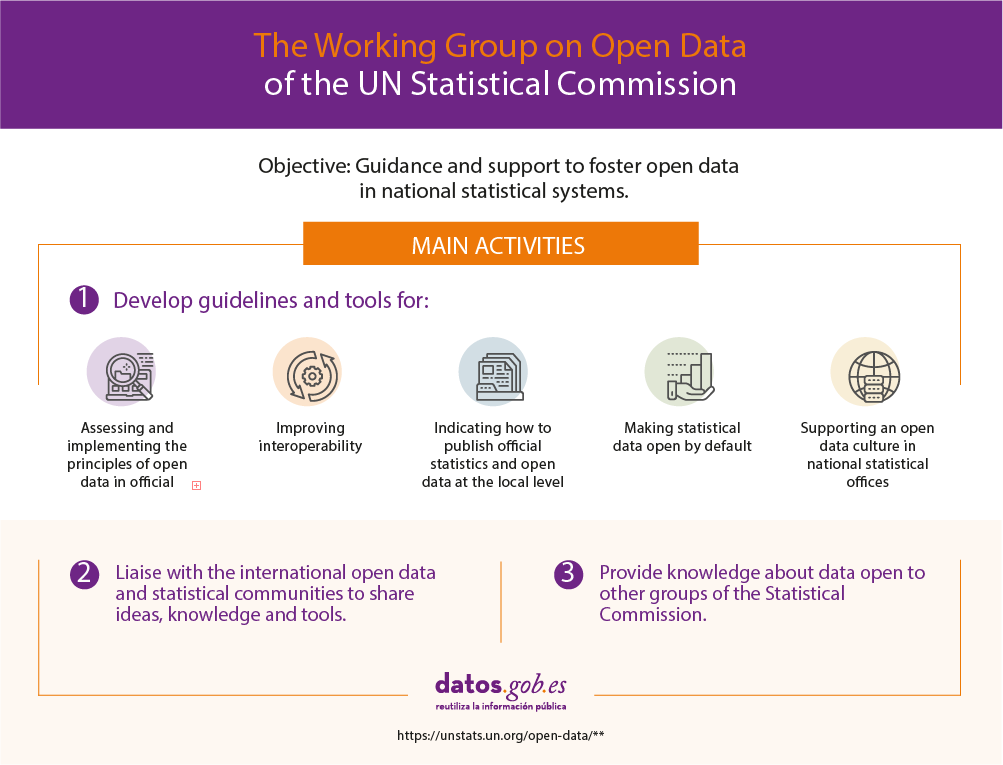
Statistical data is considered high-value data, due to its broad benefits to society, the environment, and the economy. Statistical data provides us with information on demographic and economic indicators (for example, data on GDP, educational level or population age), essential information when making decisions and formulating policies and strategies.
Such is its importance for society as a whole that the UN Statistical Commission created in 2018 an Working Group on Open Data, focused on providing support for the application of open data principles to statistical information, so that its universal and free access is provided. This working group is made up of representatives from different countries, international organizations and associations, such as the World Bank, Open Data Watch, the International Statistical Institute or representatives of the UN itself through agencies such as FAO.

In early March, this group produced a report to guide national statistical offices on open data practices in the production of official statistics. This document is divided into two sections:
• A background document on the application of open data in national statistical offices
• A background document on local level statistics in the form of open data
Let's see the conclusions of each of them.
The application of open data in national statistical offices
The report offers guidelines in the following areas:
- Default open data: The document focuses on the legal aspects of default open data, emphasizing the need for open licensing standards. According to the “Open Data Inventory”, in the period 2018-2019 only 14 out of 180 analysed countries published all their data with an open license. There are many types of internationally recognized licenses. The most common are the Creative Commons and Open Data Commons, although many countries tend to customize them. The report recommends approving an international open license in its original form or preparing a custom license, but conforming to the guidelines formulated by Open Definition. In addition to open licenses, countries also need to have a legal framework with laws on access to information and accountability.
- User-centered designs: The report highlights the need to involve users in the development of platforms and the dissemination of data to ensure that their needs are met. Some of the mechanisms that can be used are conducting surveys, interviews or focus groups. It is also necessary to measure the use of data through website analysis in order to take decisions that increase its use. Given that all countries need to create user participation strategies, it would be advisable to encourage the exchange of templates and guidelines or the holding of joint workshops.
- National reporting platforms: Data platforms must be based on four principles: clarity, adequacy, sustainability and interoperability. For these principles to be fulfilled, it is necessary to promote coordination and cooperation within the national statistical system, and the national statistical office should take the lead.
- Correlation of the Generic Model of Statistical Institutional Processes with interoperability guidelines: To facilitate the different offices to share innovative approaches regarding the collection and dissemination of statistics, it is appropriate to have a framework that includes good practices and standardized terminology. The Generic Model of Statistical Institutional Processes describes the set of actions necessary to produce official statistics, guaranteeing constant improvement. These stages are: a) specify needs; b) design; c) build; d) collect; e) process; f) analyse; g) disseminate; and h) evaluate. In order to incorporate interoperability into the Model, the most relevant interoperability practices should be incorporated into the different design phases.
- Development of an open data culture: The adoption of open data principles in the daily life of statistical institutions can mean a change of mentality. Sometimes you have to "convince" about the need to open this type of information. For this reason, it is essential to carry out internal and external communication actions, analyse existing capacities and carry out training tasks accordingly, and establish responsibilities.
Local level statistics in the form of open data
In addition to having national statistical offices, it is advisable to launch local initiatives that can provide information on specific geographic spaces such as neighbourhoods, rural areas, or census and electoral districts. This information may show disparity between regions and help in the formulation of local policies. It is also useful for civil society, the private sector and NGOs to make better decisions.
In order for comparisons to be made, the report recommends that these data be produced and disseminated following the same guidelines across the country. In addition, it urges national offices to investigate which statistical content is of most interest to users and to provide a series of recommendations, ranging from disclosure mechanisms to the most useful visualization tools. The implementation could be carried out with a gradual approach, where interaction between the different actors involved is encouraged.
The report also refers to the background document presented at the fiftieth session of the Statistical Commission, which includes guidance on understanding open data practices in official statistics. A document worth reviewing when launching such an initiative.
In short, we are dealing with a type of data of great importance, which must be shared with society through an ecosystem of publishers and always respecting the balance between openness and privacy.
Me parece muy buena iniciativa de cara a ofrecer mayor transparencia con el manejo de los datos y focalizar sobre las localidades la realidad en datos.
Javier Rodriguez